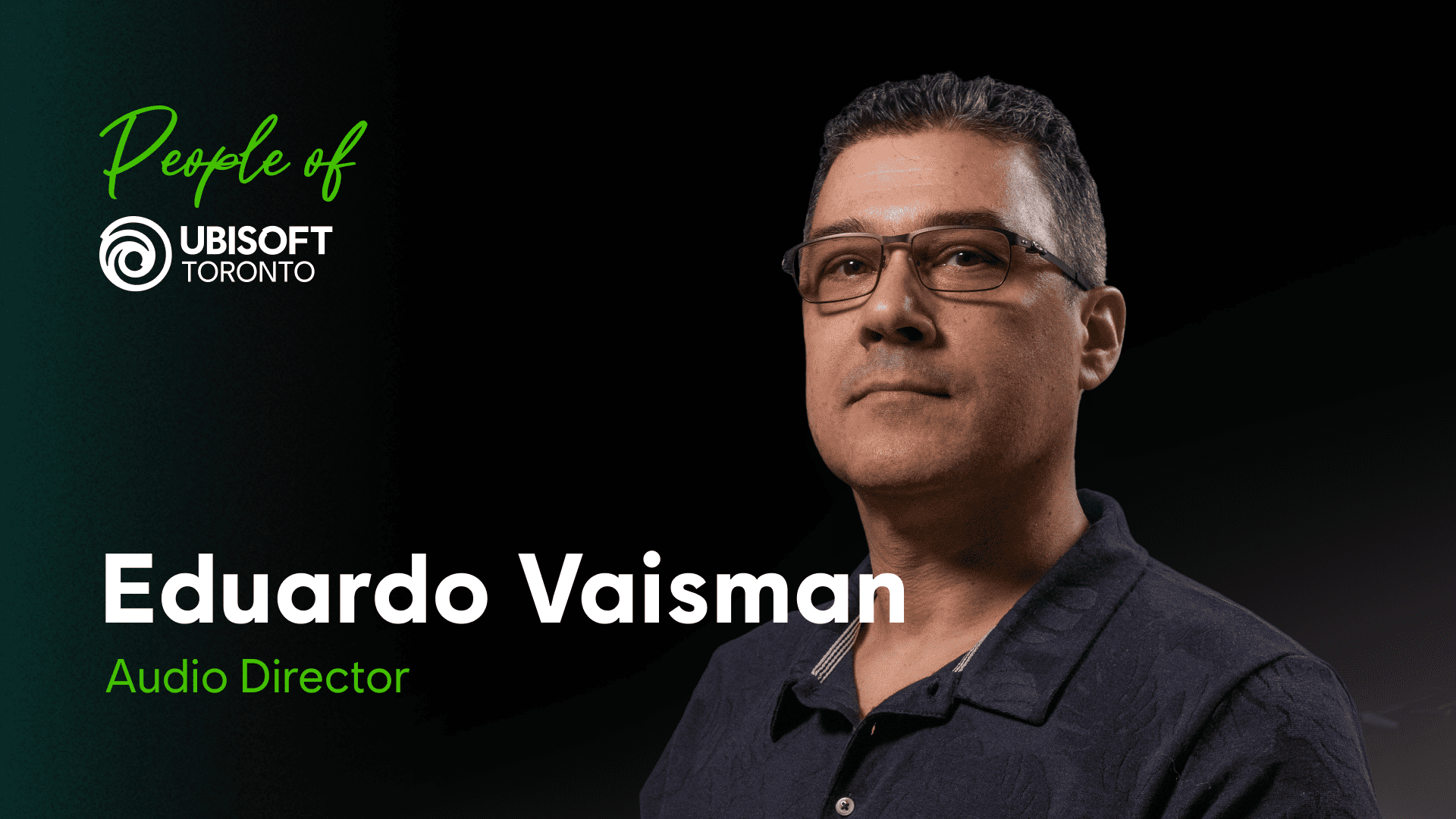Eduardo Vaisman is a BAFTA-nominated Audio Director at Ubisoft Toronto whose most recent work includes bringing Yara to life through music and sound in Far Cry 6. Read on to learn about his career journey, the audio community at Ubisoft, and his advice for others seeking to build a career in video games.
Hey Eduardo, what do you do as an Audio Director and how long have you been with Ubisoft Toronto?
As an Audio Director I provide the vision on how the final game should sound. I’m responsible for the technical and aesthetic quality of the audio in the game, covering dialogue, music, sound effects, and more.
I communicate and collaborate with the other game production departments to empower their designs and ideas through audio experience and offer solutions to technical, narrative and gameplay challenges using sound. Of course, I don’t do this alone! I’m supported by a fantastically talented team of sound designers and voice designers!
As for how long I’ve been at Ubisoft, it’s been more than eleven years! I can say I’m one of the OGs!
That’s really cool! What’s your favourite part of your role?
I love collaborating with the audio team, discussing sound ideas and concepts, and watching how they bring them to life, I also enjoy proposing game mechanics and designs that enhance the presence of audio, and of course, curating the music and mixing the final game is when I have a lot of fun.
CURRENT PROJECTS
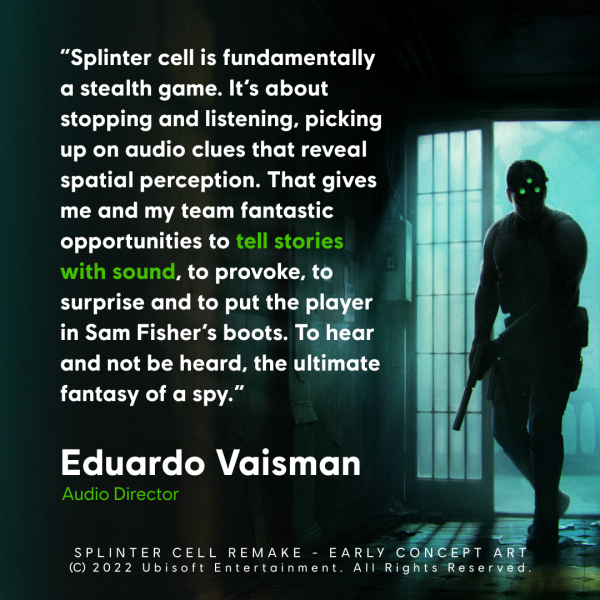
What are you currently working on? Anything you can share with us? 👀
I’m working alongside the Splinter Cell remake team, bringing an iconic game back to its peak form. We’re keeping key elements that made the game an indelible experience for fans but also making it enticing for new players who are seeking a modern AAA current-gen experience.
With the power of our Snowdrop engine, we’re able to advance many aspects of audio including using audio ray tracing for accurate simulation of obstruction and propagation. We’ll also have the ability to support multiple 3D audio formats for the existing current generation consoles and PCs. For now, that’s all I can share.
Any special memories from playing previous Splinter Cell games? What do you think makes the franchise so unique?
When I played Chaos Theory, I was instantly absorbed by the thrill of the infiltration, the silence, the game of light and shadows. I think the distinctive aspect of the franchise is that while it’s an espionage fantasy, the elements in it belong to a world where it could be possible. Another strong aspect of the franchise is it presents players with the option to step back, assess a situation and solve challenges dynamically — a counterbalance to all the run-and-gun in the market right now.
What about working on the Splinter Cell remake has you fired up?
Splinter Cell is fundamentally a stealth game. It’s about stopping and listening, picking up on audio clues that reveal spatial perception. That gives me and my team fantastic opportunities to tell stories with sound, to provoke, to surprise and to put the player in Sam Fisher’s boots. To hear and not be heard, the ultimate fantasy of a spy.
CAREER DEVELOPMENT
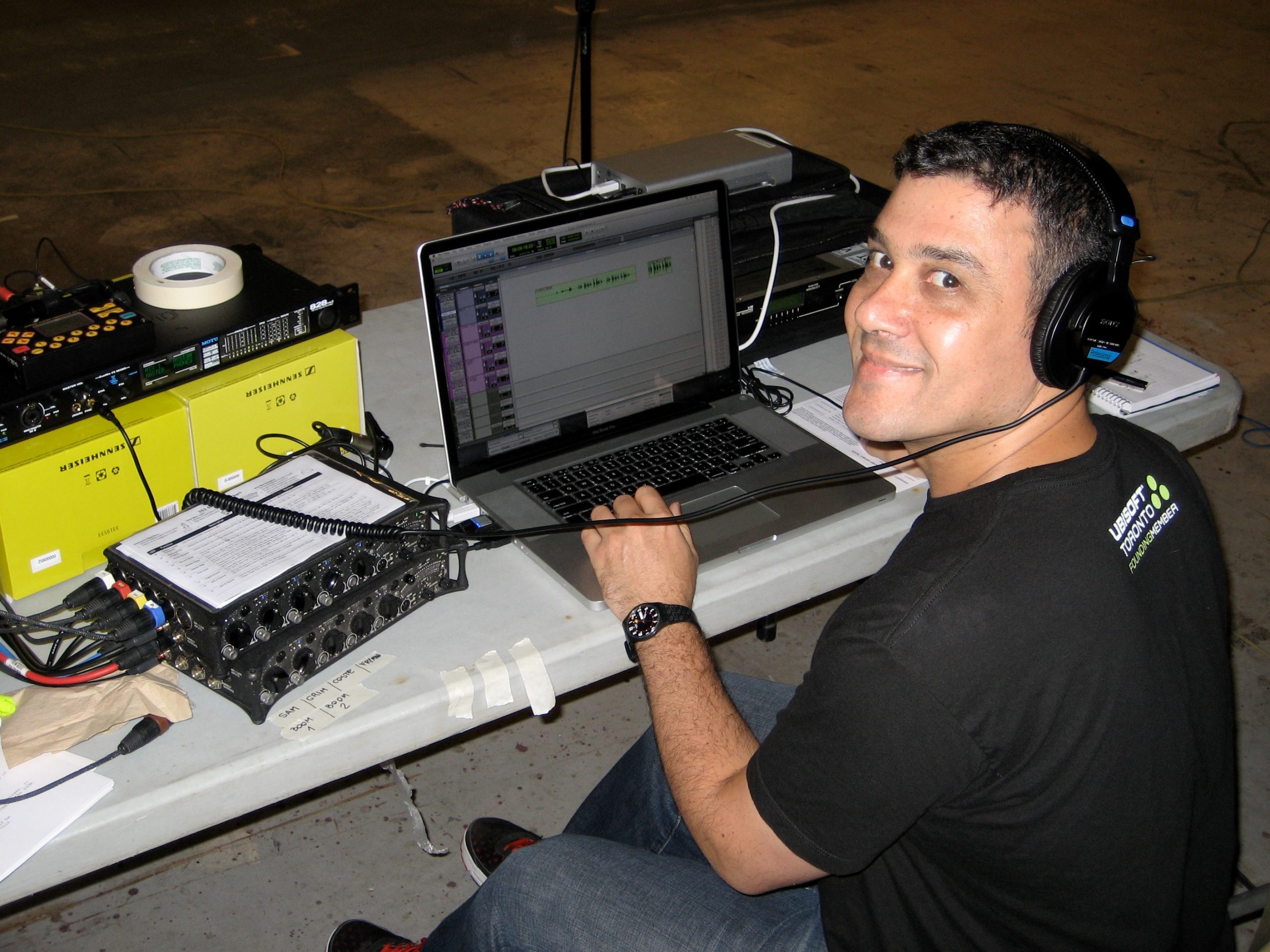
What did you do before working at Ubisoft Toronto? How’d you break into the video game industry?
Before Ubisoft Toronto, I spent 20 years working in sound for film. I have credits in over 55 feature films across six different countries in all kinds of sound roles from dialogue editor to re-recording mixer. I also did TV series and other media formats, as well as taught courses on sound design in colleges and universities. My entire professional life up to that point was about telling stories with sound.
I broke into the video game industry through simply applying to a job post. As an immigrant, I knew few people in the city and absolutely nobody in the game industry, so I took my chances. I went through the interviews, a creative test, and, Fabien Noel, my first boss and Audio Director in Splinter Cell Blacklist gave me the chance to join this great studio.
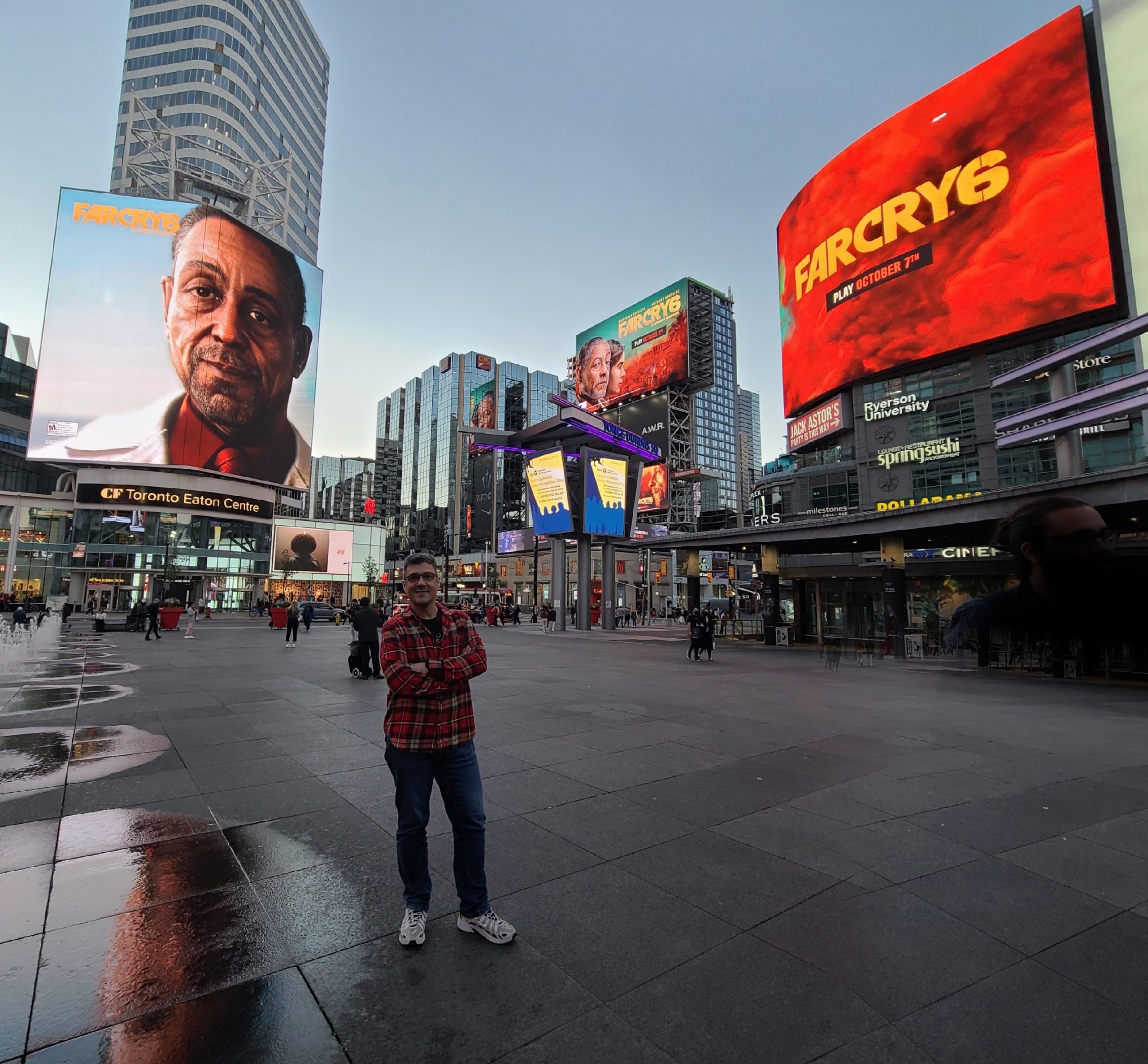
Can you describe a project you’ve worked on that you’re proudest of?
It’s gotta be Far Cry 6 as it was the first time I had the chance to leave my mark in every aspect of sound production in this massive game — from casting to music curation and collaborating with four studios to deliver the final audio product.
Our main task was “make Yara a living, breathing country and make it fun” and the approach we took was to incorporate traditional Latino-Caribbean elements such as music, accents, linguistic expressions and combine them with real ambiences recorded in Cuba. The team also did fantastic work on the weapons, vehicles and special features like the “Amigos.”
As a Latino, providing insight in the cultural aspect and even writing lyrics for songs were important moment for me. It was a massive undertaking but the team pulled its weight and I’m very satisfied with the results, which brough us multiple nominations such as NAVGTR, GIGA, G.A.N.G and BAFTA!
What are some of the key tech or tools you use regularly in your role and how do they impact your work?
The tool I use most often is the audio middleware Wwise. That’s what we use to add, organize and set behaviors to the sounds in the game. It’s a very convenient tool with multiple iterations and tools to create, mix and finalize the audio in the game.
Another tool that the team use widely here in the DAW (Digital Audio Workstation) is ‘REAPER.’ That’s the software we use to create, modify and process the sounds we are going to integrate later. It’s very flexible, allowing every team member to customize it and adapt to each artist style with minimum effort.

What are some tips you’d give to someone hoping to land a similar role to yours?
Here are a few that worked for me:
There is not a direct, straight line between where you wish to be and where you are now. Build your career with small blocks every day. Work on your craft as hard as you can, make effort in fostering relationships, listen to people’s ideas, fears, hopes, and see everyone as a teacher, be humble.
Nurture your art, not only with video games but with movies, theatre plays, opera, concerts, paintings and everything that has an emotional impact on you.
Try to force yourself away from your comfort zone as often as possible, nothing new or groundbreaking happens in the comfort zone.
LIFE AT UBISOFT
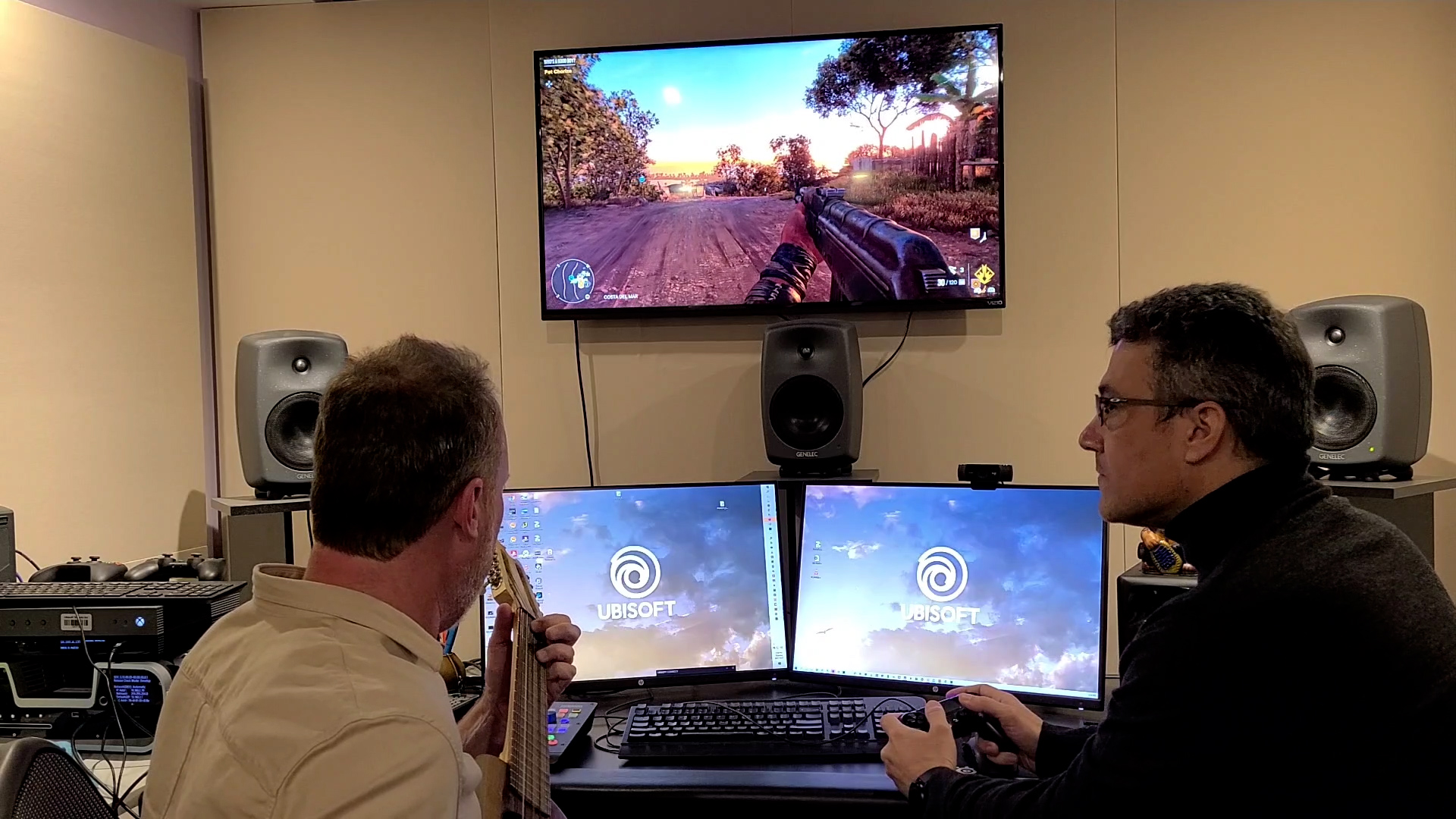
Can you describe the Audio community within Ubisoft?
The audio community in Ubisoft is open, supportive and very welcoming! From the great audio community we have here in UbiTO to all the audio experts in Ubisoft studios around the world. We have monthly virtual gatherings through an internal organization called GAAP and periodic in-person knowledge-sharing events we call “Audio Days.”
Can you share your experience as a BIPOC audio expert in the video game industry?
In all honesty, being a Latino immigrant never represented a challenge for me in the game industry and even less in Ubisoft Toronto. I haven’t felt marginalized or left behind because of it. On the contrary, having a completely different cultural background and not speaking English as my first language gave me the chance to offer a different point of view in multiple situations. We really have a diverse and open studio here.
———
People of Ubisoft Toronto is a series featuring studio members from a variety of projects and backgrounds as they share their experiences at our studio, perspective of the video game industry and, perhaps, even a sneak peek of what they’re working on! ;)
Our studio values diversity and believes in embracing differences to build stronger and more creative teams. We welcome people who would like to join us and redefine the future of games. Visit our careers page for more information on open roles and how to apply. To know more about our studio members and culture, click here.
